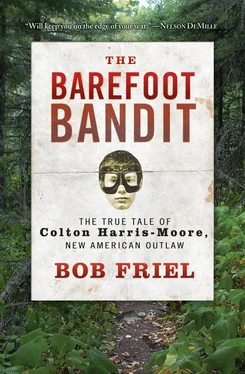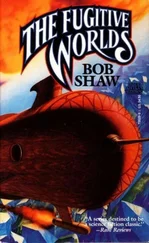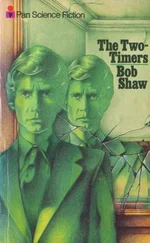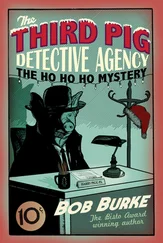Martin checked all the doors. Nothing was broken. They had only simple door-handle locks, and it appeared they were easily defeated by some kind of a slender tool like a flathead screwdriver.
They had to accept that a burglar had indeed broken in and taken a wallet and laptop. The head-shaker was that the thief had also taken a shower—leaving the puddle of water—done laundry, and eaten breakfast. Someone had eaten their porridge, sat in their chairs, maybe slept in their bed.
The losses didn’t add up to much—at least not enough to deal with the insurance hassles—so at first they decided not to report it. “He could have done anything while he was in here,” says Martin. “But nothing was damaged or even disturbed. He didn’t take Ellen’s jewelry or anything like that; he only took useful stuff.”
The following Sunday, though, after Martin went on his weekly bike ride down the valley, he heard that neighbors just up the road had surprised a burglar inside their house. The middle-aged couple had come home around 10 p.m., and as the woman opened the front door, she “startled” a slender young man over six feet tall. The burglar took off through the kitchen, knocked over a chair, and fled out the back door. Her husband chased him down the driveway, but couldn’t catch up. On his way back to the house, he found a bicycle that the burglar had apparently brought with him, so he took it inside, locking the door behind him.
They called the sheriff, and as they were waiting for a deputy to arrive, the burglar actually came back; they saw him sneaking around outside and peeking through the window. The bold young burglar disappeared as the police car pulled up. The cop investigated and discovered that the couple’s safe had been rifled, but nothing appeared to be missing. He also made a point of checking their liquor cabinet and noting it was intact—something very unusual for this type of crime with a young suspect. The couple showed him the bike and said they suspected it was the thief’s. The deputy carried the bike out to his vehicle and drove it back to the Eastsound cop shop, where he photographed it, recorded its serial number and identifying details, and then locked it inside the evidence room.
In all their years on the island, the Brodys had never heard of a burglary happening in sparsely populated Crow Valley. They felt two on the same road within such a short period of time must be related, so Martin decided he better report what had happened at their house.
He spoke to the sergeant in charge of Orcas, who had some good news and some bad. He told Martin about the getaway bike they’d confiscated at the neighbors’ home. Martin said, “Great, if you got that I’m sure that means you must be able to get fingerprints.”
“Well,” Martin says the sergeant told him, “funny thing is, we brought the bike to the station, but now it’s missing.”
Martin could not believe what he was hearing. Then he remembered something strange he’d seen on his last ride. He said, “I think I know where that bike is.” Riding along Crow Valley Road, he’d seen a bike tossed into the bushes. It was very unusual, but he didn’t stop, thinking maybe its owner was in the thickets picking blackberries. The sergeant asked what kind of bike it was and Martin told him.
“No,” said the cop, “the one we had was a black Gary Fisher with red flames painted on it.”
Martin felt a strange little buzz. “That’s funny… I have a Gary Fisher, black with red flames,” he said. “But it couldn’t have been mine because it’s here at the house—I just rode it.”
It was an odd enough coincidence that the sergeant drove out to the Brodys. Martin now remembered that his bike had seemed particularly dirty. But it’d been in the exact spot he always kept it—among the tools in their little garden shed attached to the carport—so it didn’t register more than an odd feeling. Sure enough, though, when they checked the serial number it was the same bike the police had locked away in their evidence room.
It was almost unbelievable. The only explanation was that the burglar had been staying in the Brodys’ house and using Martin’s bike to travel around and try to rip off their neighbors. (There’d also been a break-in and attempt to access the computer at a nearby hardware store, Island Supply, where deputies had found a bare footprint.) When the burglar had run off and lost the bike to the police, he followed them the three and a half miles back to Eastsound that same night. Residents near the cop shop later reported that their lawn furniture had been moved into a comfortable arrangement overlooking the station.
The burglar had run a stakeout on the police.
San Juan County doesn’t provide Orcas with twenty-four-hour police coverage. There are a couple of hours when a deputy is on call but there’s no one actively on duty. Once the cop shop closed down for the night, the incredibly ballsy burglar jimmied open the sergeant’s office window, which had no security system protecting it, not even a stick to keep it from being slid open.
Once inside, the thief had enough time to rummage around the sergeant’s desk, find the keys to the evidence room, and resteal Martin Brody’s bike.
He then rode it back to Crow Valley and returned it to its rightful owner.
THE SERGEANT LEFT THE Brodys’ without taking fingerprints off the bike. Martin and Ellen went about their day, but with a different sense of reality setting in about their island home. Was this someone with a vendetta against the police or a twisted sense of decency, or was this just a crook with a sense of humor and big brass pair?
Ellen began cleaning the house and had just wiped one of the fingerprints off the washer and dryer. Oops, she thought. The other print still looked good, though. She could clearly see the swirls with her naked eye. She called the sheriff’s office and asked if they wanted to come back out and collect it. They said no.
A couple of days later, Martin was standing at the window when he saw a flash of color in the garden. He reached for the birding binoculars he always kept handy, but came up empty. They were gone, too. The Brodys decided that before they went away again they’d better put in deadbolts. Six hundred dollars later, a locksmith had rekeyed all the knobs and drilled out the jambs and installed new locks. They went about their pleasant Orcas lives for the next several weeks, he puttering in the garden, she in her woodshop. But things weren’t quite the same. They each now kept a key with them at all times, and locked up whenever they left the property. They hoped, though, that this had all been just a freak occurrence.
ORCAS’S LOCAL NEWSPAPER, THE Islands’ Sounder , regularly runs a log from the San Juan County Sheriff’s Office. It’s a popular feature where you find short, fascinating vignettes such as “An 83-year-old Eastsound woman reported one pair of fur-lined moccasins and three almost-new pair of beige women’s underwear stolen from an unlocked old fruit-packing barn.” There was also the epic saga of two “friendly” Great Danes that got loose and went llama chasing, and the cautionary tale of a man who fired three rounds from his shotgun aiming for an otter under his porch and instead hit his neighbor in the neck (neither the llamas nor the neighbor were seriously injured). After the follow-the-bouncing-bike incidents at the Brodys’ and the cop shop, though, the only thing officially reported by San Juan County sheriff Bill Cumming was that there’d been a “security breach” at the Orcas station.
HEADING SOUTH FROM THE Brodys’, Turtleback’s shell slopes down to the water, the tip of the turtle’s tail splitting Massacre Bay from West Sound. A boaty area, West Sound is filled with bright sails tacking back and forth every summer day. Continuing west on a cliff-clinging road, you come to the tiny hamlet of Deer Harbor. Two marinas and several inns operate on this small picturesque bay. Around the same time as the Crow Valley bike caper, strange things were happening at the Deer Harbor Inn—though no one would suspect a thing until September, when the bills came due.
Читать дальше












